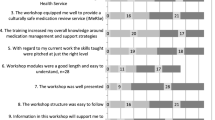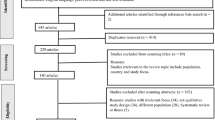Abstract
Background It has been previously suggested that the risk of medicine-related problems—i.e., negative clinical outcomes, adverse drug reactions or adverse drug events resulting from the use (or lack of use) of medicines, and human error including that caused by healthcare personnel—is higher among specific ethnic minority groups compared to the majority population. Objective The focus of this study was on reducing medicine-related problems among Arabic-speaking ethnic minorities living in Denmark. The aim was twofold: (1) to explore the perceptions, barriers and needs of Arabic-speaking ethnic minorities regarding medicine use, and (2) to use an education program to enhance the knowledge and competencies of the ethnic minorities about the appropriate use of medicines. Settings Healthcare in Denmark is a tax-financed public service that provides free access to hospitals and general practitioners. In contrast to the USA or the UK, serving ethnically diverse populations is still a relatively new phenomenon for the Danish healthcare system. Ethnic minorities with a non-Western background comprised a total of 6.9 % of the Danish population. Methods Data were collected through qualitative research. Four focus group interviews were conducted before and four after the education program. Thirty Arabic-speaking participants were recruited from language and job centers in Copenhagen. Participants received teaching sessions in Arabic on appropriate medicine use. The education program was evaluated by two methods: a written quiz for knowledge evaluation and focus group interviews for process evaluation. It took place during the first semenester of 2012. Results The majority of the participants were dissatisfied with the knowledge about medicines inherited from their parents. They also expressed their frustrations due to communication problems with Danish doctors. According to the impressions and quiz results of participants, the program was relevant, rich in information and effective. The program helped bridge the gap between participants and doctors. The commonality of the culture, language and gender shared by the researcher pharmacist and participants enhanced the success of the program. Conclusion The education program may potentially reduce medicine-related problems by providing participants with knowledge and competencies about appropriate medicine use. We recommend implementing education programs for ethnic minorities using the cultural competence approach to the appropriate use of medicines. Ideally, programs should be implemented in places that are frequented by ethnic minorities, and taught by health professionals with the same ethnic background as participants.





Similar content being viewed by others
References
Alhomoud F, Dhillon S, Aslanpour Z, Smith F. Medicine use and medicine-related problems experienced by ethnic minority patients in the United Kingdom: a review. Int J Pharm Pract. 2013;21(5):277–87.
Gordon KJ, Smith FJ, Dhillon S. The development and validation of a screening tool for the identification of patients experiencing medication-related problems. Int J Pharm Pract. 2005;13(3):187–93.
Szczepura A. Access to health care for ethnic minority populations. Postgrad Med J. 2005;81(953):141–7.
Kontopantelis E, Roland M, Reeves D. Patient experience of access to primary care: identification of predictors in a national patient survey. BMC Fam Pract. 2010;11(1):61.
Lip GYH, Kamath S, Jafri M, Mohammed A, Bareford D. Ethnic differences in patient perceptions of atrial fibrillation and anticoagulation therapy: the West Birmingham Atrial Fibrillation Project. Strok. 2002;33(1):238–42.
Lip GYH, Khan H, Bhatnagar A, Brahmabhatt N, Crook P, Davies MK. Ethnic differences in patient perceptions of heart failure and treatment: the West Birmingham heart failure project. Heart. 2004;90(9):1016–9.
Morgan M, Figueroa-Muñoz JI. Barriers to uptake and adherence with malaria prophylaxis by the African Community in London, England: focus Group Study. Ethn Health. 2005;10(4):355–72.
Horne R, Graupner L, Frost S, Weinman J, Wright SM, Hankins M. Medicine in a multi-cultural society: the effect of cultural background on beliefs about medications. Soc Sci Med. 2004;59(6):1307–13.
Pardhan S, Mahomed I. Knowledge, self-help and socioeconomic factors in South Asian and Caucasian diabetic patients. Eye. 2004;18(5):509–13.
Lawton J, Ahmad N, Hallowell N, Hanna L, Douglas M. Perceptions and experiences of taking oral hypoglycaemic agents among people of Pakistani and Indian origin: qualitative study. BMJ. 2005;330(7502):1247.
Gordon K, Smith F, Dhillon S. Effective chronic disease management: patients’ perspectives on medication-related problems. Patient Educ Couns. 2007;65(3):407–15.
Chan C. A study of health services for the Chinese minority in Manchester. Br J Community Nurs. 2000;5(3):140–7.
Kumar K, Gordon C, Toescu V, Buckley CD, Horne R, Nightingale PG, et al. Beliefs about medicines in patients with rheumatoid arthritis and systemic lupus erythematosus: a comparison between patients of South Asian and White British origin. Rheumatology. 2008;47(5):690–7.
Wheatly RS, Shelly MP. Drug treatment during Ramadan. Stopping bronchodilator treatment is dangerous. BMJ. 1993;307(6907):801.
McDowell SE, Coleman JJ, Ferner RE. Systematic review and meta-analysis of ethnic differences in risks of adverse reactions to drugs used in cardiovascular medicine. BMJ. 2006;332(7551):1177–81.
Ormerod S, McDowell SE, Coleman JJ, Ferner PRE. Ethnic differences in the risks of adverse reactions to drugs used in the treatment of psychoses and depression. Drug Saf. 2008;31(7):597–607.
Tsang C, Majeed A, Banarsee R, Gnani S, Aylin P. Recording of adverse events in English general practice: analysis of data from electronic patient records. Inform Prim Care. 2010;18(2):117–24.
Harris Y, Gorelick PB, Samuels P, Bempong I. Why African Americans may not be participating in clinical trials. J Natl Med Assoc. 1996;88(10):630–4.
Søndergård B, Haugbølle LS, Traulsen JM, El-souri M, Mygind A. Optimal drug use among non-ethnic Danes (part 2) Implementation of medication review. (Optimal lægemiddelanvendelse blandt ikke-etniske danskere (del 2); Gennemførelse af medicingennemgang). Copenhagen: Faculty of Pharmacy, University of Copenhagen; 2009.
Lauridsen L, Gudex C, Hansen M. Evaluation of medication review given to non-ethnic Danish patients. (Evaluering af medicingennemgang givet til ikke-etniske danske patienter). Odense: University of Sounthern Denmark; 2009.
Folmann N, Jørgensen T. Ethnic minorities—illness and the use of healthcare services (Etniske minoriteter – sygdom og brug af sundhedsvæsenet). Copenhagen: The National Board of Health; 2006.
Volodina A, Bertsche T, Kostev K, Winkler V, Haefeli WE, Becher H. Drug utilization patterns and reported health status in ethnic German migrants (Aussiedler) in Germany: a cross-sectional study. BMC Public Health. 2011;11:509.
Knudsen P, Søndergård B, Rossing C, Herborg H. Evidence report: survey of medicine-related problems (Evidensrapport: Kortlægning af lægemiddelrelaterede problemer). Copenhagen: Pharmakon; 2006.
Povlsen L, Olsen B, Ladelund S. Educating families from ethnic minorities in type 1 diabetes—experiences from a Danish intervention study. Patient Educ Couns. 2005;59(2):164–70.
Kleinman A. Patients and healers in the context of culture: an exploration of the borderland between anthropology, medicine and psychiatry. Berkeley: University of California Press; 1981.
Cross TL, Others A. Towards a culturally competent system of care: a monograph on effective services for minority children who are severely emotionally disturbed. Marts 1989 [Last cited 6. December 2013]; Hentet fra: http://eric.ed.gov/?id=ED330171.
Isaacs MR, Benjamin MP. Towards a culturally competent system of care. Volume II: programs which utilize culturally competent principles. December 1991 [Last cited 6. December 2013]; Hentet fra: http://eric.ed.gov/?id=ED345393.
Farley JE. Minority-majority relations. USA: Prentice Hall; 2005.
Exploring the Intersection Between Cultural Competency and Managed Behavioral Health Care Policy: Implications for State and County Mental Health Agencies. [Internet]. National Health Care for the Homeless Council. [Last cited 6. December 2013]. Hentet fra: http://www.nhchc.org/bibliograpy/exploring-the-intersection-between-cultural-competency-and-managed-behavioral-health-care-policy-implications-for-state-and-county-mental-health-agencies/.
How health systems can address health inequities linked to migration and ethnicity [Internet]. [Last cited 6. December 2013]. Hentet fra: http://www.euro.who.int/en/health-topics/health-determinants/social-determinants/publications/2010/how-health-systems-can-address-health-inequities-linked-to-migration-and-ethnicity.
Gallegos JS, Tindall C, Gallegos SA. The need for advancement in the conceptualization of cultural competence. Adv Soc Work. 2008;9(1):51–62.
National Association of Social Workers (NASW). NASW standars for cultural competence in social work practice. Washington: NASW; 2001.
Krasnik A, Christiansen T, Høyer K, Vallgårda S. Health Services and Health policy. Denmark: Gyldendal/Munksgaard; 2008.
Herborg H, Sørensen EW, Frøkjaer B. Pharmaceutical care in community pharmacies: practice and research in Denmark. Ann Pharmacother. 2007;41(4):681–9.
Statistical Yearbook 2012. Statistics Denmark. Copenhagen, 13 June 2012.
Ebrahim S, Bowling A. Handbook of health research methods: investigation, measurement and analysis. New York: McGraw-Hill International; 2005. p. 639.
Al-Saeedi M, Elzubier AG, Bahnassy AA, Al-Dawood KM. Treatment-related misconceptions among diabetic patients in Western Saudi Arabia. Saudi Med J. 2002;23(10):1243–6.
Michaelsen J, Krasnik A, Nielsen A, Norredam M, Torres AM. Health professionals’ knowledge, attitudes, and experiences in relation to immigrant patients: a questionnaire study at a Danish hospital. Scand J Public Health. 2004;32(4):287–95.
Mygind A, Espersen S, Nørgaard LS, Traulsen JM. Encounters with immigrant customers: perspectives of Danish community pharmacy staff on challenges and solutions. Int J Pharm Pract. 2013;21(3):139–50.
Clark T, Sleath B, Rubin RH. Influence of ethnicity and language concordance on physician–patient agreement about recommended changes in patient health behavior. Patient Educ Couns. 2004;53(1):87–93.
Nielsen AS, København DF. Sundhed på dit sprog: evalueringsrapport. Københavns Kommune, Sundheds- og Omsorgsforvaltningen, Folkesundhed København; 2006. 40 p.
Acknowledgments
We are grateful to the people who participated in the program. We would also like to thank Pharmakon for allowing us to use original teaching materials for translation and adaptation.
Funding
This project was funded by the Faculty of Health and Medical Sciences, University of Copenhagen, Denmark.
Conflicts of interest
The authors have no conflicts of interest to declare.
Author information
Authors and Affiliations
Corresponding author
Electronic supplementary material
Below is the link to the electronic supplementary material.
Rights and permissions
About this article
Cite this article
Cantarero-Arévalo, L., Kassem, D. & Traulsen, J.M. A culturally competent education program to increase understanding about medicines among ethnic minorities. Int J Clin Pharm 36, 922–932 (2014). https://doi.org/10.1007/s11096-014-0009-8
Received:
Accepted:
Published:
Issue Date:
DOI: https://doi.org/10.1007/s11096-014-0009-8




